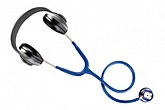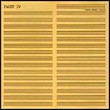|
|

From head to heart Following our retroscope series of latter years, here we go again! Here's Speakers' corner's cousin; From head to heart. Luna Kafé's focused eye on great events, fantastic happenings, absolute milestones, or other curious incidents from the historic shelves'n'vaults of pop'n'rock. Blowing our ears and our head, punching our chest and shaking our heart. Making us go sentimental, but not slaphappy. This moonth the Lunar time-machine lands by a 40 year stop sign in Germany for some herbs, weeds, spices and cabbages, as in Weißkraut, Blaukraut, Sauerkraut, Unkraut, Bohnenkraut, or Rübenkraut. Or, if you prefer: Kraut made as a musical dish.
Faust Faust was established in Hamburg, northern Germany in 1970. The members soon got in touch with left-wing journalist Uwe Nettelbeck who secured them a contract with Polydor Records unheard of at the time for an unknown new band. Allegedly they got an advance around £ 200 000, some old recording equipment and an engineer to their disposal. They set up the gear in an old school house in the small town Wümme between Hamburg and Bremen to record the debut album. The final result was not at all what the businessmen at Polydor expected, crudely played and sung and interspersed with sound collages and noise. Like the contract, quite unheard of at the time. The album, simply called Faust, was released all the same, on clear vinyl in a luxurious transparent sleeve with the famous Faust X-ray fist. Apart from being the person in the German legend who sold his soul to the devil for knowledge and pleasures of this world, Faust is German for fist. The album didn't make any stir in Germany, but was quickly picked up by John Peel who promoted Faust on his BBC show. Which resulted in healthy sales in Britain. The second, Faust So Far, was more cohesive, light-weight, song and tune oriented, even close to pop, but far from conventional all the same. It had a cool design, too. All in black and with illustrations in an envelope inside, one for each song of the album. After the affair with Polydor, Faust was picked up by another businessman, Richard Branson of Virgin Records in London. Three of the five Faust members at the time collaborated with multi artist Tony Conrad on an album called Outside The Dream Syndicate, released on Virgin's subsidiary Caroline label. It's a fine collection of minimalist and drone music, recorded at home in Wümme. Conrad btw. was renowned for his time with La Monte Young's avant garde combo Theatre Of Eternal Music aka. The Dream Syndicate in New York in the early 1960s, among others along with a young John Cale pre Velvet Underground. Virgin then campained Faust in Britain with The Faust Tapes, a collage of home recordings not originally intended for release. They don't sound any poorer than the ones on the debut album. On the contrary. The LP was sold at the price of a seven inch single, 48 pence at the time, and was a huge success. Allegedly the entire edition of 100 000 copies crossed the counters of the record shops. It is said that the album was an inspiration for all British new wave bands a few years later... The first - and last - proper Faust album for Virgin was Faust IV. The Faust gang including manager and producer Uwe Nettelbeck entered Virgin's own studio, The Manor, in the English countyside north of Oxford, in the spring of 1973. They recorded the majority of the album there, while a very young Mike Oldfield was allowed to use the studio in between for the recording of his debut album Tubular Bells. When the appoined studio time was up, they didn't have enough appropriate material for an entire album. Two tracks recorded previously in W ü mme were thus included. One of them was the album opener, the almost 12 minutes long "Krautrock", the most characteristic offer of the lot here. It's dominated by a repetitive distorted synthesizer riff that goes on and on. Enter an even more distorted guitar and other assorted noisy effects. An excellent example of drone music. Maybe it's a bit too much going on at a time here, otherwise "Krautrock" is a forerunner of trance music. I guess the term Krautrock was established before Faust used it. I'm not quite convinced that the track fathoms the entire Krautrock movement, going on in Germany from the late 1960s and some years on. But it has some elements of Tangerine Dream (the drone), Can and Amon Düül II (the rougher and intuitive edges). And there are traces of Velvet Underground, Frank Zappa and his Mothers Of Invention and early Pink Floyd here, too. The rest of the album is more clean produced, including some almost straight pop melodies, but with some noisy moments thrown in for good measure. The only song with German lyrics, "Läuft... Heisst Das Es Läuft Oder Es Kommt Bald... Läuft", is a quiet and beautiful piece with a characteristic echo'ed electric guitar over acoustic guitar, flute, and vocals mixed rather low. Towards the end the band has to destroy the mellow feel, though, with some annoying clockwork-like percussion and a fuzzed-out electric guiar. The album closer, "It's A Bit Of A Pain", has a bit of both extremes, too, a soft acoustic singer-songwriter feel is disturbed by a very much interfering electric guitar that completely takes over towards the end. And what on earth is that young Swedish lady halfway through reading in her native language? The other remaining songs and instrumentals also include strange blends. "The Sad Skinhead" is a mix of happy guitar-pop, vibraphone and half-amateurish drums. Quite hilarious with slight reggae rhythms and lyrics like 'going places, smashing faces...'. "Jennifer" is rather laid-back, dominated by drowsy vocals, bass and a distant electric guitar that grows to total domination before the affair is finished off with a honky-tonk piano. Bizzarre... "Just A Second (Starts Like That)"/"Picnic On A Frozen River"/"Deuxieme Tableux" starts with an electric guitar on the attack, followed by synthesizer blips of the bird tweet kind, then a pulsating one before a nasty electric guitar and crazy piano drags the whole thing off the rails. "Giggy Smile" starts as a quite conventional song with verses and choruses and all; sort of alternative half-merry pop in the Syd Barrett solo era vein, then enter a saxophone solo of the jazzy kind before a long half-merry organ and electric guitar instrumental interlude brings the track to a conclusion. Faust's uniqueness seems, in my humble opinion, to stem from the band members' intuitive approach to the music. They are not interested in perfection, not at all. Spontaneity is the thing! I'm not sure if they broke any boundaries with Faust IV, but they certainly stretched them. The album didn't achieve the success of The Faust Tapes. I remember when I lived in Bergen in the late 1970s and early 1980s I bumped into Faust IV every time I checked the bargain bins of a couple of excellent record shops there. The Faust Tapes on the other hand, was long gone. It took some years, though, before I achieved enough courage to buy a copy. In retrospect it was no need to hesitate. Faust IV demonstrates the diversity within the band and includes some of their best tracks. And the album seems to me to be as representative and as good an introduction to the band as Faust So Far or The Faust Tapes. The band almost fell apart during the mixing stage of the album. Two of the members left for a while and didn't return before the final gigs of a UK tour towards the end of 1973. By then Virgin had given up the idea to launch the band in the USA with a massive tour and instead rejected the band altogether. The members went back to Germany and recorded quite a lot at Giorgio Moroder's studio (later renowned as a disco producer) in München for a fifth album. Instad of completing the album, the band fell to pieces. There was a little bit Faust activity in the 1980s and interest in the group grew when Recommended Records in England relaunched the first three LPs in 1979 and quite a bit previously unreleased archive material a few years later. Some core members reunited around 1990. Since then original Faust members augmented by other musicians have released several albums and toured on both sides of the Atlantic under the Faust banner. By now there exist two different versions of the band. Two days after this month's full moon, it is 40 years since Faust IV was released. The day in between, one of the Faust branches will headline the first evening of this years Rock In Opposition Fesival outside Carmaux in southern France. I'll be there! Copyright © 2013 JP
|
| © 2013 Luna Kafé |
